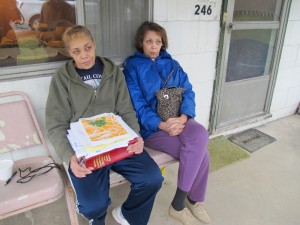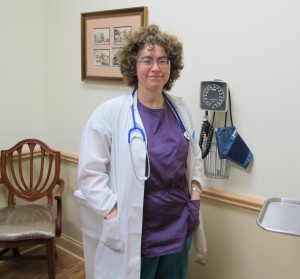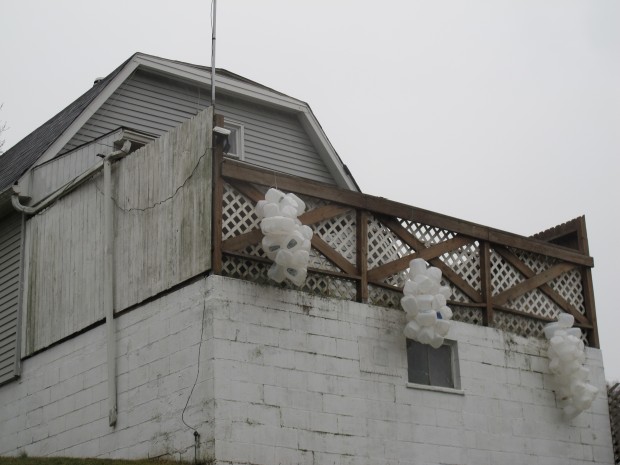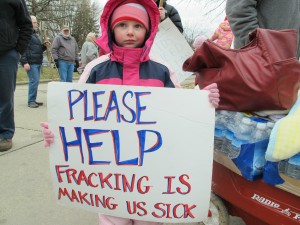Fracking health complaints received little follow-up from the Department of Health

Susan Phillips / StateImpactPA
Jeanie Moten with her sister on their mother's porch in Rea, Pa. She holds a stack of medical records. The Motens say they received no help from DOH regarding their fracking health complaints. A case file released by the DOH through a Right-To-Know request confirmed that.
Newly released documents from the Pennsylvania Department of Health on fracking-related health complaints reveal a lack of follow-through and inaccurate record-keeping. The telephone logs, which span four years from 2011 to 2015, were gained through a Right-to-Know request by the environmental group Food and Water Watch.
The documents include about 87 separate complaints from residents and workers who feared exposure to fracking chemicals and were looking for advice from the Department of Health. But notes taken by agency workers show little information is collected from patients. In some cases, doctors were looking for help. And at least in one case, important details were inaccurate.
The bulk of the complaints came from northeast and southwest Pennsylvania. They often included similar complaints of skin rashes, respiratory problems and nose bleeds.
The names of the patients, physicians and their addresses are blacked out. But Fayette county resident Linda Headley confirms that case number 59 is a complaint she made last August. Although Headley doesn’t own the mineral rights to a property she bought in 2005, she says she has five gas wells on her property, including one Marcellus Shale gas well. She says one of those wells is “problematic” and gas company workers regularly release toxic fumes from what she says is a condensate tank. She says a white misty cloud gets released, some of it gaseous and some of it liquid.
Headley says last July she went out to pick berries with her 6-year-old son. She noticed a gas worker on site.
“We were walking down the driveway and the well-tender kind of looked behind us and he just pushed the button and [waste from the condensate tank went] all over us,” she said. “You could feel the brine all over us and you could taste it. It has a salty bitter taste.”

Susan Phillips / StateImpactPA
Dr. Amy Pare at her practice in suburban Pittsburgh. Case numbers 6 and 19 were related to her patients. She says attempts to get help from the DOH were frustrated by constant requests for more information and "paranoid" staffers.
Headley says she and her son were covered in a slippery substance, were coughing, and they felt “shakey.” Despite several people telling her “not to bother” calling the DEP or DOH because “they wouldn’t do anything,” Headley reported the incident right away to the Department of Environmental Protection and later the Department of Health. But she says neither agency followed through with any testing or advice. The Department of Health told her to go to her doctor.
“I thought the health department would know more. You know what I mean?” she said. “But I don’t have health insurance so for me to go and have these tests done I can’t afford it.”
Headley says doctors at a nearby clinic told her they couldn’t help her because they weren’t trained in environmental toxicology.
But what really surprised Headley was looking at the recently released case file, which she says has inaccurate details and false information regarding follow-up. Her then six-year-old son is listed as being 11. The problematic gas well is reported to be 500 feet from her property when it’s 500 feet from her house. The notes report that the Department of Environmental Protection told the Department of Health that ambient air surrounding her house had been tested. She says to her knowledge that’s never happened.
“I’ve been trying to get [the air] tested,” she said. “Nobody wants to test it.”
Neil Shader, a spokesman for the Department of Environmental Protection says, the agency has no record of Headley’s call or the incident on her property.
The case file also reports a letter was sent to Headley by the Department of Health. She says she never received it.
Dr. David Brown is a toxicologist who has worked with the Centers for Disease Control and Prevention. He treats patients exposed to fracking chemicals in southwest Pennsylvania. Dr. Brown says he was “appalled” by both the DEP and the DOH response.
“They should have called 911,” he said.
Brown says this was a clear case of exposure that could have resulted in immediate and dangerous health impacts. He says the person on the other end of the phone had a responsibility to call emergency services. Brown had some terse advice for the Department of Health.
“You’re a state agency, you’re a public health agency, be a public health agency,” he said.
Brown says Headley’s exposure story is similar to patients he’s treated at the Southwest Pennsylvania Environmental Health Project, a clinic established to care for people exposed to toxins related to natural gas drilling.
“We’ve done detailed exams of well over a hundred people and we always see [exposures to toxic] air and sometimes we see air and water [exposures] combined,” he said. “It’s episodic. You can go for some days and nothing happens, and then something happens.”
But he also says that DEP would know the substances released during the incident and should have followed up with Headley.
The Right-to-Know request includes documented calls from workers worried about OSHA violations, and toxic chemicals melting their boots. Health professionals and staffers from the federal Centers for Disease Control also made calls on behalf of residents seeking information.
Dr. Amy Pare, a plastic surgeon in Washington County, confirmed to StateImpact that case numbers 6 and 19 were related to her patients.
Pare says it was difficult to get any information from the Department of Health. She says she provided hundreds of pages of health data on workers and residents she treated for skin lesions.
“We faxed hundreds of pages to them,” she said. “After a while my staff said we can’t do this anymore. If you want to be a crusader, you need to do it yourself.”
So Pare took over. But she says the agency kept telling her they needed more information.
“They would say something like, they didn’t have page three. But they didn’t need page three.”

Susan Phillips / StateImpact Pennsylvania
Empty water jugs used to haul clean water hang from a house in the small town of Rea, Washington County. Residents suspected nearby gas drilling as the culprit. The DEP investigation concluded drilling was not to blame. According to newly released documents, the Department of Health did little to follow up.
Case number 19 addressed a complaint from four residents of Rea, Pennsylvania. The case notes say the DOH is still waiting on information from Dr. Pare.
Case number six references seven patients treated by Dr. Pare. It notes that the DOH “did a cursory review of the clinical data,” which it then provided to several state and federal public health agencies. There’s no indication that the patients themselves ever received the review. And it’s unclear what the review concluded. But the status reads: “Inquiry Closed.”
On several occasions, Pare says she was told not to engage in any email exchanges regarding fracking health impacts. Instead, she was to give staffers her number, and they had to call her.
“They were definitely paranoid,” she said.
In fact they may have had good reason to be paranoid. StateImpact Pennsylvania reported last year that DOH workers were silenced on drilling-related health inquiries. One veteran employee told StateImpact she was instructed not to return phone calls from residents who expressed health concerns about natural gas development.
“We were absolutely not allowed to talk to them,” said Tammi Stuck, who worked as a community health nurse in Fayette County for nearly 36 years.
Normally, when fielding calls, Stuck would discuss the caller’s problem, ask about symptoms, and explain what services the department or other agencies could offer.
But for drilling-related calls, the protocols were completely different. Stuck said she and her fellow employees were told to take the caller’s name and number and forward the information to a supervisor.
“And somebody was supposed to call them back and address their concerns,” she said, adding that she never knew whether these callbacks occurred.
StateImpact also reported on a list of fracking “buzzwords” that if mentioned by a caller, the DOH employees were not allowed to speak to them. Employees also reported getting reprimanded for discussing anything related to shale gas at public meetings.
The call logs released through the Right-To-Know request have few details, lacking the name of the company drilling nearby, or even the name or number of the well site suspected of releasing toxic chemicals into the air, or polluting water wells.

Susan Phillips / StateImpact Pennsylvania
Skylar Sowatsky holds up a sign at a rally in Butler, Pa. She and her family moved after they say fracking polluted their water. Her mother Kim McEvoy says the DOH was no help.
Dr. Brown says information gathering at the department has to improve.
“[To find] out out first what people are exposed to,” he said. “The second thing that needs to be done is we have to find out how the people are being exposed and how much. And the third thing that needs to be done is we need to systematically look at the health effects that they’re experiencing.”
He also says local M.D.’s need training on how to recognize environmental exposures, and where to go for help.
“If you come in with a rash, how is the physician supposed to know that that’s a rash from some chemical released in the middle of the night next to a child’s bedroom,” said Brown. “They can’t know that. We’re looking at what could be long-time serious health problems from living near these wells.”
The Department of Health released a statement saying it is reviewing current protocols. Governor Wolf is seeking $100,000 in his proposed budget for a Marcellus Shale health registry.
Dr. Pare wants to see the department do more right now to help residents struggling with health issues in the gas fields.
“I think they should send people down here to check it out,” she said. [The DOH] has never done that. [The gas drillers] are making tons of money doing this. I think for less than $50,000 you can send a couple of high school kids door-to-door and have people pee in a bottle. This is un-American. This is wrong. I find this appalling. You can make lots of money doing honest healthy work and this is neither.”
Read the documents obtained by Food and Water Watch below. Note: Personal identifying information has been redacted by the Department of Health.
















